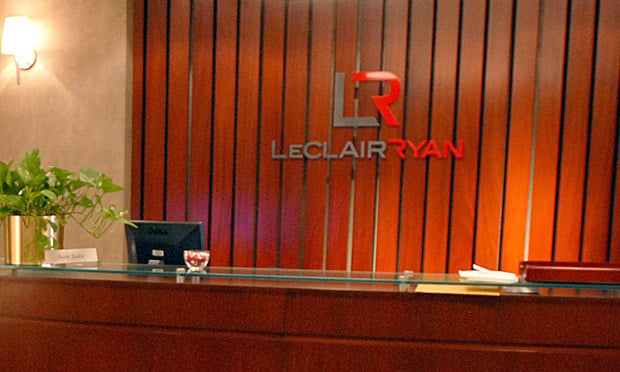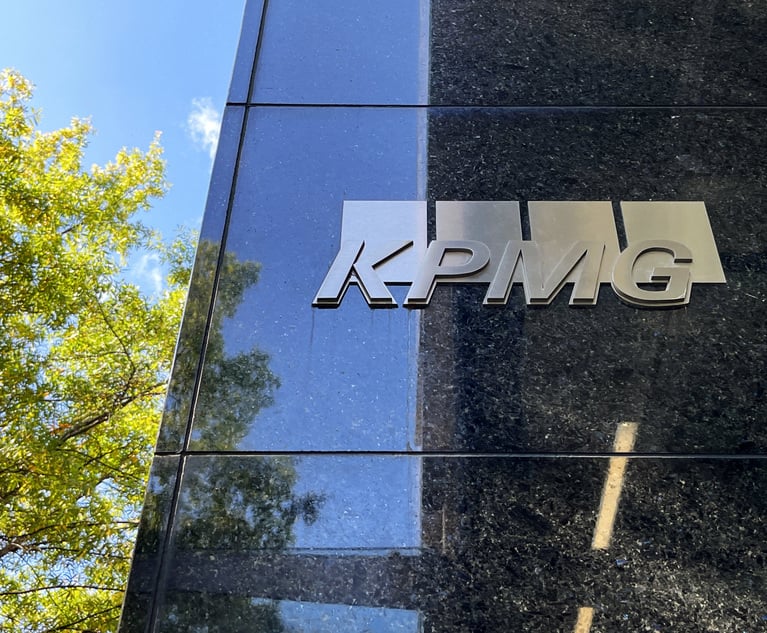LeClairRyan, Lender Clash Over Converting Defunct Firm's Bankruptcy to Chapter 7
Attorneys for the dissolving firm and its lender will square off in court Thursday over a U.S. trustee's motion seeking to appoint a liquidator.
September 25, 2019 at 04:16 PM
4 minute read
The original version of this story was published on The American Lawyer
 LeClairRyan's offices in New York. Photo: Rick Kopstein/ALM
LeClairRyan's offices in New York. Photo: Rick Kopstein/ALM
A federal bankruptcy judge is poised to hear arguments Thursday about whether dissolution proceedings for now-defunct LeClairRyan should be handled by a court-appointed liquidator.
The firm's primary lender, ABL Alliance LLLP, has backed a motion by the acting U.S. trustee for the region to move the law firm from Chapter 11 to Chapter 7, pointing to slower-than-anticipated collections since LeClairRyan filed for bankruptcy at the start of the month.
LeClairRyan, however, says that Chapter 11 remains the most efficient way to handle its liquidation, arguing that collections have picked up since the first week after the filing.
"The debtor has had a successful start in collecting revenue, reducing expenses and fulfilling its duties through this chapter 11 case," a team of attorneys for Hunton Andrews Kurth argued on behalf of the firm in a filing Monday.
The firm's initial Chapter 11 filing, in Virginia's Eastern District, indicated it owed $6.8 million out of an initial $15 million loan to ABL, an entity linked to lender Virginia Commercial Finance.
ABL has the first priority of two secured creditors, followed by ULX Partners, the joint venture the firm launched with UnitedLex to handle support services in 2018. Owed $8 million according to the Chapter 11 filing, UnitedLex has been silent during the bankruptcy process.
U.S. Trustee John Fitzgerald III, the acting trustee for Virginia, the District of Columbia and three other southeastern states, made the initial argument for moving the matter to Chapter 7 now, contending in a filing earlier this month that there is no question that the conversion is an inevitability. LeClairRyan now exists in name only, after its members voted to dissolve the firm in late July.
He said that a court-appointed liquidator would immediately be able "to stop the hemorrhaging, make decisions about what contracts to assume or reject, and start paving the road to recoveries from avoidance actions."
On the other hand, waiting would be worse, Fitzgerald argued.
"Delaying conversion would only saddle the estate with additional administrative expenses and render the transition to a Chapter 7 harder as the few employees left will continue to leave leaving the trustee with little to no historical knowledge or support," he said.
ABL then came out in support of the conversion in a filing Monday, saying it would not consent to letting the firm continuing to use cash on hand to support its unwinding after Thursday.
"The sole reason ABLA consented to the Debtor's use of its cash collateral at the outset of this case as a Chapter 11 proceeding was the perceived benefit from the continuity in collection of the accounts receivable and the apparatus that was in place to do so," the lender's attorneys with McGuireWoods argued.
That has not actually been the case, they continued, pointing to the firm's second weekly report from Sept. 15. That showed LeClairRyan was 28% behind its budgeted cash collections and that expenses exceeded the budget by 20%.
"The unfortunate reality is that cumulative collections have faltered to unacceptable levels despite continuity with the debtor-in-possession in control under chapter 11," ABL continued, adding that excessive and highly compensated staffing, inflated IT expenses and personnel inefficiencies were driving up expenses.
LeClairRyan's response, which followed ABL's filing but was directed to the U.S. trustee's initial motion, said that collections have been catching up to projects and that it has been able to reduce its debt to the lender by $1.8 million since the bankruptcy process began. But the firm did say that it was engaged in discussions with ABL and representatives of the U.S. trustee aimed at reaching an agreement for the next steps for the dissolution.
Also at stake in Thursday's hearings is the firm's plans for disposing of inactive client files that have not moved with its former attorneys to their new firms. LeClairRyan is looking for permission to destroy all remaining files after providing clients a 90-day window to respond.
LeClairRyan's longtime IT provider, Proxios, has argued that the procedure outlined by the firm is incomplete and, among other failings, might obligate it to negotiate with or obtain payment from the firm's former clients to either retrieve or store their files.
Read More
LeClairRyan Bankruptcy Could Keep Creditors, Partners Busy for Years
How LeClairRyan's Grand Plans Unraveled
Rivals Scoop Up LeClairRyan Lawyers as Clock Ticks on Dissolution, Insurance Coverage
This content has been archived. It is available through our partners, LexisNexis® and Bloomberg Law.
To view this content, please continue to their sites.
Not a Lexis Subscriber?
Subscribe Now
Not a Bloomberg Law Subscriber?
Subscribe Now
NOT FOR REPRINT
© 2025 ALM Global, LLC, All Rights Reserved. Request academic re-use from www.copyright.com. All other uses, submit a request to [email protected]. For more information visit Asset & Logo Licensing.
You Might Like
View All

'Lack of Independence' or 'Tethered to the Law'? Witnesses Speak on Bondi
4 minute read
The Law Firm Disrupted: Tech Investment Is Necessary Yet Expensive. The Big Four Have a Leg Up
Trending Stories
- 1'A Death Sentence for TikTok'?: Litigators and Experts Weigh Impact of Potential Ban on Creators and Data Privacy
- 2Bribery Case Against Former Lt. Gov. Brian Benjamin Is Dropped
- 3‘Extremely Disturbing’: AI Firms Face Class Action by ‘Taskers’ Exposed to Traumatic Content
- 4State Appeals Court Revives BraunHagey Lawsuit Alleging $4.2M Unlawful Wire to China
- 5Invoking Trump, AG Bonta Reminds Lawyers of Duties to Noncitizens in Plea Dealing
Who Got The Work
J. Brugh Lower of Gibbons has entered an appearance for industrial equipment supplier Devco Corporation in a pending trademark infringement lawsuit. The suit, accusing the defendant of selling knock-off Graco products, was filed Dec. 18 in New Jersey District Court by Rivkin Radler on behalf of Graco Inc. and Graco Minnesota. The case, assigned to U.S. District Judge Zahid N. Quraishi, is 3:24-cv-11294, Graco Inc. et al v. Devco Corporation.
Who Got The Work
Rebecca Maller-Stein and Kent A. Yalowitz of Arnold & Porter Kaye Scholer have entered their appearances for Hanaco Venture Capital and its executives, Lior Prosor and David Frankel, in a pending securities lawsuit. The action, filed on Dec. 24 in New York Southern District Court by Zell, Aron & Co. on behalf of Goldeneye Advisors, accuses the defendants of negligently and fraudulently managing the plaintiff's $1 million investment. The case, assigned to U.S. District Judge Vernon S. Broderick, is 1:24-cv-09918, Goldeneye Advisors, LLC v. Hanaco Venture Capital, Ltd. et al.
Who Got The Work
Attorneys from A&O Shearman has stepped in as defense counsel for Toronto-Dominion Bank and other defendants in a pending securities class action. The suit, filed Dec. 11 in New York Southern District Court by Bleichmar Fonti & Auld, accuses the defendants of concealing the bank's 'pervasive' deficiencies in regards to its compliance with the Bank Secrecy Act and the quality of its anti-money laundering controls. The case, assigned to U.S. District Judge Arun Subramanian, is 1:24-cv-09445, Gonzalez v. The Toronto-Dominion Bank et al.
Who Got The Work
Crown Castle International, a Pennsylvania company providing shared communications infrastructure, has turned to Luke D. Wolf of Gordon Rees Scully Mansukhani to fend off a pending breach-of-contract lawsuit. The court action, filed Nov. 25 in Michigan Eastern District Court by Hooper Hathaway PC on behalf of The Town Residences LLC, accuses Crown Castle of failing to transfer approximately $30,000 in utility payments from T-Mobile in breach of a roof-top lease and assignment agreement. The case, assigned to U.S. District Judge Susan K. Declercq, is 2:24-cv-13131, The Town Residences LLC v. T-Mobile US, Inc. et al.
Who Got The Work
Wilfred P. Coronato and Daniel M. Schwartz of McCarter & English have stepped in as defense counsel to Electrolux Home Products Inc. in a pending product liability lawsuit. The court action, filed Nov. 26 in New York Eastern District Court by Poulos Lopiccolo PC and Nagel Rice LLP on behalf of David Stern, alleges that the defendant's refrigerators’ drawers and shelving repeatedly break and fall apart within months after purchase. The case, assigned to U.S. District Judge Joan M. Azrack, is 2:24-cv-08204, Stern v. Electrolux Home Products, Inc.
Featured Firms
Law Offices of Gary Martin Hays & Associates, P.C.
(470) 294-1674
Law Offices of Mark E. Salomone
(857) 444-6468
Smith & Hassler
(713) 739-1250









